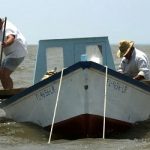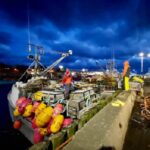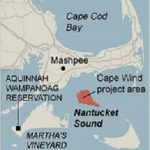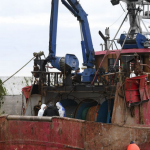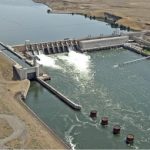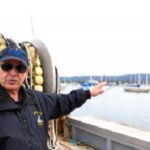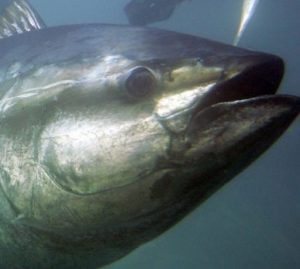Daily Archives: February 20, 2017
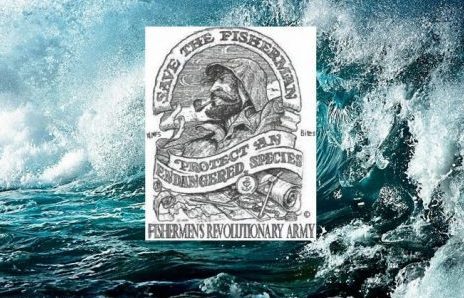
Harvey Haddock on fisherman’s rights.
In light of the recent court decision in regard to the proposed New York windmill farm allowing the project to proceed despite its potential effects on long established fishing industries, this scene, excerpted from the in-progress novel, “Delusions of a Madman”, showcases an irreverent slice of life from the Fishermans Dock Co-op, which illuminates the question; What are a fisherman’s rights? On a cold windy morning at the Fishermans Dock Co-op, all the boats are in, and a couple of small groups of fishermen are scattered at the docks unloading spots, generally discussing the last few days of fishing, and invariably complaining about one regulation or another. Henry’s in a hurry to the office today, it seems the morning coffee has done its magic, and he needs to make a deposit for Alice and Lil, the office secretary’s. He hurries through the dock careful not to slip on the ice, and enters the warm office, heads right, passing Alice sitting at her desk, and Lil, in the next room. “Again?” says Alice. Continue reading the story here 22:02
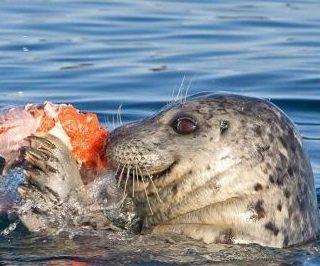
Study says seals eat more Chinook than Southern resident killer whales
Seals are eating more Chinook than Southern resident killer whales. That’s bad for both endangered species’ recoveries. “The seals might not be the enemy as much as the problem is that we’ve lost forage fish available to them,” said Joe Gaydos, science director of the SeaDoc Society on Orcas Island. According to a recent Canadian study, the amount of Chinook salmon eaten by seals in the Salish Sea has increased from 68 metric tons in 1970 to 625 metric tons in 2015. That’s double the amount Southern resident killer whales ate in 2015 in the same location, and six times more than commercial and recreational fisheries according to the study. Continue reading the story here 12:20
Scallops scuffle pitting small boats against big
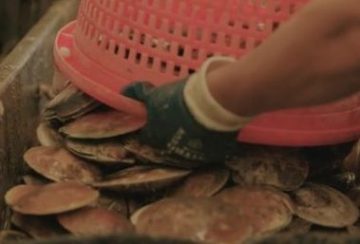 A disagreement over the right to fish for scallops off New England is pitting small boats against big ones in one of the most lucrative fisheries in the U.S. The federal government maintains different rules for the small- and big-boat scallop fisheries, though they work some of the same areas. Small boat fishermen say the conflict has arisen in the northern Gulf of Maine, a critically important fishing area stretching roughly from Boston to the border of Maine and Canada. At issue is the fact that the northern Gulf of Maine is fertile ground for scallops right now, and rules allow the bigger boats to harvest more of them. The smaller boats have a possession limit of 200 pounds, while the largest boats have no such limit, because they are regulated instead by a limited number of days at sea. Continue reading the article here 11:48
A disagreement over the right to fish for scallops off New England is pitting small boats against big ones in one of the most lucrative fisheries in the U.S. The federal government maintains different rules for the small- and big-boat scallop fisheries, though they work some of the same areas. Small boat fishermen say the conflict has arisen in the northern Gulf of Maine, a critically important fishing area stretching roughly from Boston to the border of Maine and Canada. At issue is the fact that the northern Gulf of Maine is fertile ground for scallops right now, and rules allow the bigger boats to harvest more of them. The smaller boats have a possession limit of 200 pounds, while the largest boats have no such limit, because they are regulated instead by a limited number of days at sea. Continue reading the article here 11:48
Linda Bean once hoped to be to lobster what Perdue is to chicken. What happened?
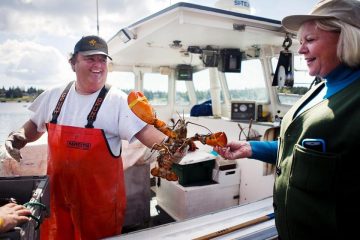 Linda Lorraine Bean, the other L.L. Bean, has spent the last decade promoting her lobster empire, one that merged the cachet of her family name with the popularity of the state’s top crustacean.,, So what happened to the sprawling business venture that Bean hoped to make as synonymous with lobster as Frank Perdue’s empire is to chicken? Bean, now in her 70s, declined to comment despite repeated attempts to reach her and those connected to her. It’s been a quiet departure for a woman not known to shy away from the spotlight. Read the article here 11:13
Linda Lorraine Bean, the other L.L. Bean, has spent the last decade promoting her lobster empire, one that merged the cachet of her family name with the popularity of the state’s top crustacean.,, So what happened to the sprawling business venture that Bean hoped to make as synonymous with lobster as Frank Perdue’s empire is to chicken? Bean, now in her 70s, declined to comment despite repeated attempts to reach her and those connected to her. It’s been a quiet departure for a woman not known to shy away from the spotlight. Read the article here 11:13
DMC researchers test technique to determine lobster’s age
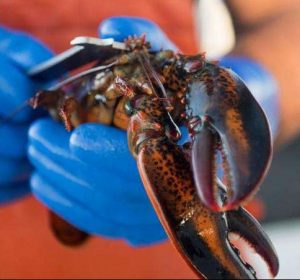 Research professor Rick Wahle and graduate student Carl Huntsberger are testing a technique at the University of Maine Darling Marine Center to determine the age of lobsters. Unlike fish, mollusks and trees, Wahle says lobsters and other crustaceans molt—or cast off their skeletons thereby discarding external signs of growth. That means a lobster’s age is estimated on size, but it’s a rough determination because ocean conditions affect the crustacean’s growth rate. Not knowing a lobster’s age is problematic for scientists and fishery managers seeking to measure the health of the fishery and the sustainability of the stock. Continue reading the story here 10:06
Research professor Rick Wahle and graduate student Carl Huntsberger are testing a technique at the University of Maine Darling Marine Center to determine the age of lobsters. Unlike fish, mollusks and trees, Wahle says lobsters and other crustaceans molt—or cast off their skeletons thereby discarding external signs of growth. That means a lobster’s age is estimated on size, but it’s a rough determination because ocean conditions affect the crustacean’s growth rate. Not knowing a lobster’s age is problematic for scientists and fishery managers seeking to measure the health of the fishery and the sustainability of the stock. Continue reading the story here 10:06
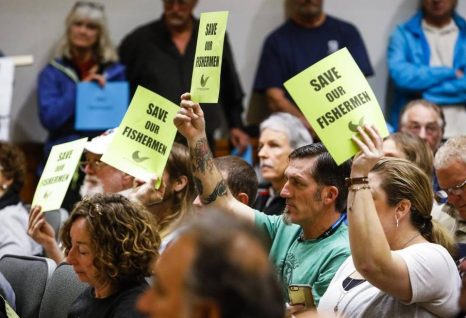
Thanks to the supervisors who protected SLO County fishermen
Many thanks to the San Luis Obispo County supervisors that support the fishermen, ranchers, farmers and our ports and harbor districts in the county regarding the Chumash Heritage National Marine Sanctuary issue. The supervisors that did not support us claimed that this was about oil. This issue has nothing to do with oil. It has to do with the livelihoods of those of us that make our living on land and sea. We are here to protect our livelihoods from federal intrusion and nothing more. One of the supervisors claimed they would not manage fisheries. Well, I can assure the public that neither he nor anyone in our county will be making that decision. It will be made in Washington, D.C., just like all of the hundreds of other rules that will be made regarding all national sanctuary management. Federal rules are not made by cities, counties or states. They are made only by the federal government. Link 09:53
Fisherman’s Strike Ends: “We Had A Gun To Our Heads”, Says Union Leader
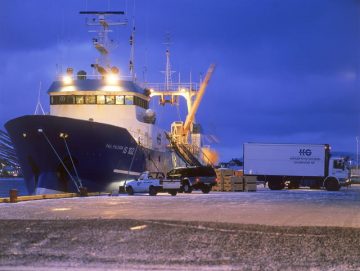 The strike that went on for about two months has finally drawn to a close, but one union official says the deal was reached after the Minister of Fisheries essentially threatened to enact a law forcing the fishermen back to work. RÚV reports that the vote to go back to work was a close one: 52.4% voted in favour, with 46.9% voting against, and only 53.7% of eligible fishermen took part in the vote. As to be expected from such a close vote, opinion was mixed amongst fishermen reporters spoke to. A great many were simply pleased to be back to work, while many others were still unsatisfied with the terms of the new collective bargaining agreement. Continue reading the story here 09:10
The strike that went on for about two months has finally drawn to a close, but one union official says the deal was reached after the Minister of Fisheries essentially threatened to enact a law forcing the fishermen back to work. RÚV reports that the vote to go back to work was a close one: 52.4% voted in favour, with 46.9% voting against, and only 53.7% of eligible fishermen took part in the vote. As to be expected from such a close vote, opinion was mixed amongst fishermen reporters spoke to. A great many were simply pleased to be back to work, while many others were still unsatisfied with the terms of the new collective bargaining agreement. Continue reading the story here 09:10

































